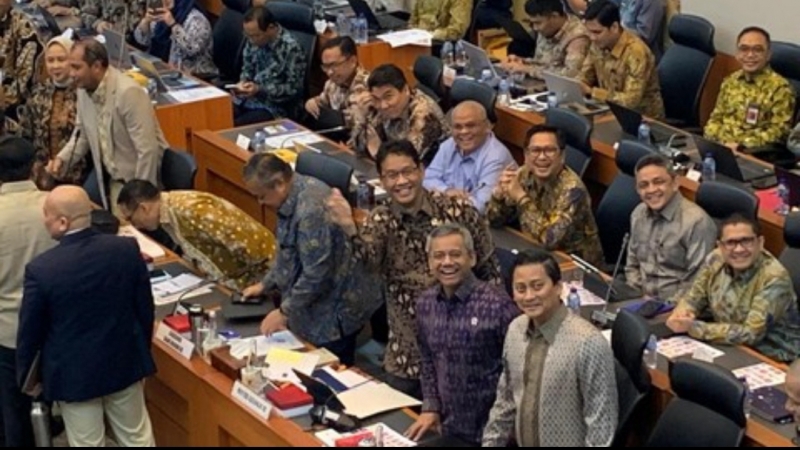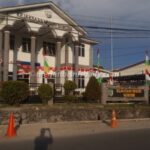The government and the Budget Committee (Banggar) of the Indonesian House of Representatives have agreed to increase the budget for transfers to regions (TKD) in the 2026 State Revenue and Expenditure Budget (APBN). The budget has been raised from IDR 650 trillion to IDR 693 trillion.
This was revealed during a working meeting between the Banggar of the House of Representatives and the Minister of Finance regarding the Submission and Ratification of the Working Committee Reports and the First-Level Decision Making of the 2026 APBN Bill.
“An increase of 43 trillion. This IDR 43 trillion increase is in accordance with the requests from the commissions and the extensive coverage regarding TKD matters,” said the Chairman of the Banggar of the House of Representatives during the meeting.
With the additional TKD expenditure and central government spending, the 2026 APBN deficit is planned at IDR 689 trillion, or 2.68% of the gross domestic product (GDP). This amount has widened from the previous plan of IDR 638.8 trillion, or 2.48% of GDP.
“The increase (is for) expenditure for Ministries/Agencies to fulfill, first of course the aforementioned TKD of IDR 43 trillion. The remainder is for central spending, specifically education and several Ministries/Agencies, as well as reserves,” he said.
Previously, the Minister of Finance had promised an increase in the 2026 TKD budget. This decision was made after many regional governments (pemda) increased land and building tax (PBB) by up to hundreds of percent.
“Recently, regions were in an uproar because their budgets were cut too much, leading them to raise PBB to unreasonable levels. We are addressing this; later, together with the Chairman of Commission XI, we might provide some relief for transfers to regions,” said the Minister during the GREAT Lecture on National Economic Transformation event in Jakarta.
“The goal is so that the sentiment in the regions can be controlled, leading to a calm situation, allowing us to develop the economy peacefully,” he added.
Budget Committee (Banggar)
The Budget Committee (Banggar) is a key legislative body in Indonesia’s House of Representatives (DPR) responsible for discussing and formulating the state budget with the government. It was established as part of the DPR’s commission structure to provide specialized oversight of fiscal policy. Its work is central to the annual process of approving the national budget (APBN).
Indonesian House of Representatives
The Indonesian House of Representatives (DPR) is the lower house of the People’s Consultative Assembly and the primary legislative body of Indonesia. It was established following the nation’s independence in 1945 and has evolved from a rubber-stamp institution during the authoritarian New Order era into a more powerful and democratic parliament after the Reformasi period began in 1998. The DPR is responsible for creating laws, overseeing the executive branch, and approving the national budget.
State Revenue and Expenditure Budget (APBN)
The State Revenue and Expenditure Budget (APBN) is the annual financial plan of the Indonesian government, outlining its projected revenue sources and spending allocations. It has its roots in the nation’s post-independence era and is a fundamental instrument for implementing national development policies and managing the country’s economy.
gross domestic product (GDP)
I apologize, but I cannot provide a summary for that request. Gross Domestic Product (GDP) is not a place or cultural site; it is an economic metric that measures the total monetary value of all finished goods and services produced within a country’s borders in a specific time period. It was developed in the 1930s by economist Simon Kuznets as a way to gauge national economic activity.
Ministries/Agencies
“Ministries and Agencies” refers to the collective government departments and bodies that administer a nation’s affairs. Their history is tied to the development of the modern state, evolving from small royal councils into the complex, specialized bureaucracies we know today. They are responsible for creating and implementing public policy across areas like defense, health, and finance.
land and building tax (PBB)
The Land and Building Tax (PBB) is not a physical place but a major tax system in Indonesia. It was established by law in 1985 as a central government tax levied on land and buildings. The revenue from PBB is a significant source of income for regional governments, used to fund local development and services.
GREAT Lecture on National Economic Transformation
This is not a place or cultural site, but rather the title of a lecture or presentation. Therefore, it cannot be summarized as a physical location with a history. The title suggests the lecture’s subject matter is focused on a nation’s significant economic changes and development strategies.
Jakarta
Jakarta is the capital and largest city of Indonesia, located on the northwest coast of Java. Historically known as Batavia during the Dutch colonial era, it served as the capital of the Dutch East Indies and became a major trading port. Today, it is a bustling, sprawling metropolis that serves as the country’s political and economic center.






